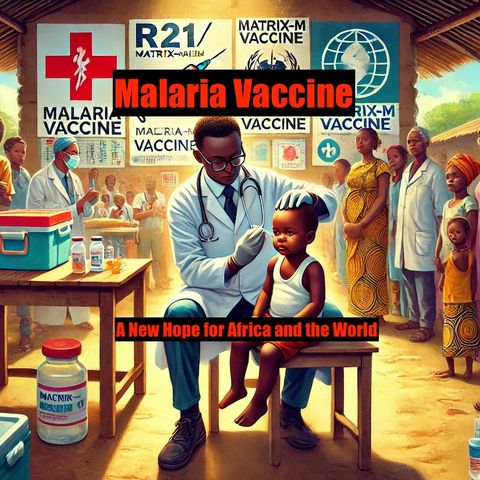Groundbreaking Malaria Vaccine Achieves Over 75% Efficacy, Offering Hope for Eradicating the Deadly Disease

Download and listen anywhere
Download your favorite episodes and enjoy them, wherever you are! Sign up or log in now to access offline listening.
Groundbreaking Malaria Vaccine Achieves Over 75% Efficacy, Offering Hope for Eradicating the Deadly Disease
This is an automatically generated transcript. Please note that complete accuracy is not guaranteed.
Description
In a groundbreaking development in global health, scientists have achieved a significant milestone with the creation of a highly effective malaria vaccine. Malaria, a life-threatening disease caused by parasites transmitted...
show moreThe new vaccine, developed by researchers at the University of Oxford, has demonstrated an efficacy of over 75% in advanced trials, a figure that stands well above the World Health Organization's target efficacy of 50% for malaria vaccines. The vaccine, known as R21/Matrix-M, uses a protein from the surface of the malaria parasite to trigger an immune response, coupled with an adjuvant called Matrix-M to boost the body’s immune defenses.
The recent trials included more than 450 children in Burkina Faso, one of the countries hardest hit by malaria. The participants received doses of the vaccine before the peak of the malaria season. Remarkably, the efficacy remained high for at least a year after the initial vaccination, which is a significant improvement over previous malaria vaccines.
The high efficacy of R21/Matrix-M is seen as a potential game-changer in the fight against malaria. Each year, malaria causes more than 400,000 deaths globally, the majority of which are children under five years old in Africa. The introduction of an effective vaccine could save millions of lives and dramatically reduce the burden on healthcare systems in endemic regions.
Moreover, the vaccine's development process also highlights a leap in vaccine technology and collaboration. The use of the Matrix-M adjuvant, which is derived from the Quillaja saponaria tree, shows how natural products can play a robust role in modern medicine. Also, the successful trial results from Burkina Faso underscore the importance of conducting research in locations where the disease has a significant impact, ensuring that the interventions developed are both effective and applicable in real-world settings.
The next steps involve seeking regulatory approval from global and regional health authorities. Simultaneously, manufacturing plans are being ramped up, with the involvement of the Serum Institute of India, which has committed to producing at least 200 million doses annually, pending regulatory green lights.
Health experts around the world are optimistic about the implications of this vaccine for global health. An effective and widely available malaria vaccine can not only reduce mortality but also significantly curb the economic impact of malaria on vulnerable economies.
In conclusion, the development of the R21/Matrix-M vaccine represents a key victory in the long battle against malaria and points toward a future where the disease could eventually be eradicated. This advancement could reshape the landscape of global health, particularly for millions in malaria-endemic regions who continue to suffer the devastating effects of the disease.
Information
| Author | QP-4 |
| Organization | William Corbin |
| Website | - |
| Tags |
Copyright 2024 - Spreaker Inc. an iHeartMedia Company

Comments